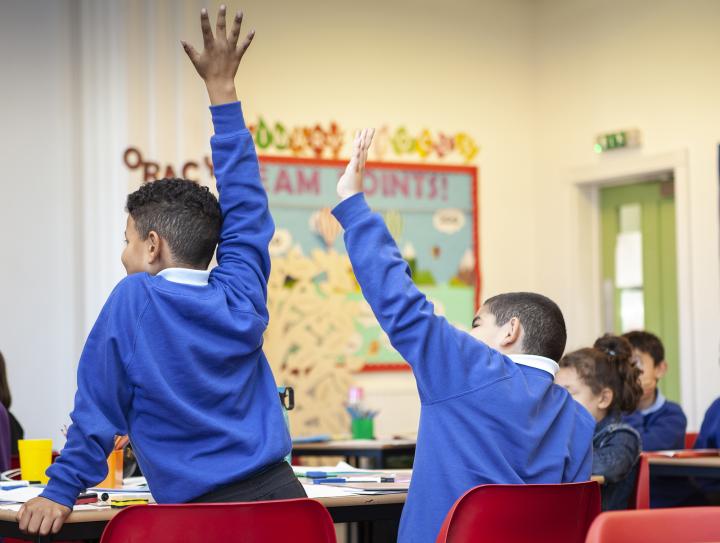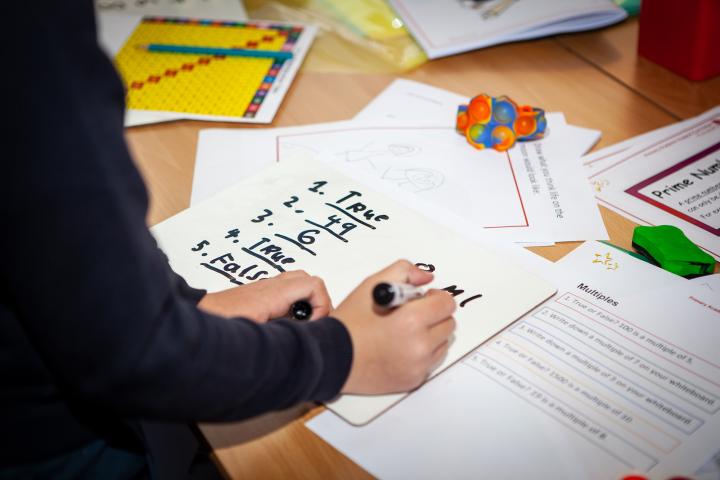Champions of classroom inclusivity
The researchers campaigning for racial and linguistic equality in education.

To say Professor Rowena Arshad CBE and Dr Yvonne Foley are passionate about improving racial and linguistic equality in education would be an understatement. In their roles as Co-directors of the University’s Centre for Education for Racial Equality in Scotland (CERES) they are promoting diversity in learning while informing social policy.
A changing pupil demographic
The pupil population in Scotland has changed over the past decade. The figures speak for themselves.
In 2010, there were 33,929 pupils recorded as not white, rising to 57,859 in 2019. The number of languages spoken in Scotland in 2010 was 136, rising to 154 languages in 2019. The number of pupils whose main home language is not English also increased from 28,610 in 2010 to 61,818 in 2019.
Emerita Professor Arshad, Chair in Multicultural and Anti-Racist Education, and former Head of the University’s Moray House School of Education from 2013 to 2019, explains the findings of studies carried out by CERES over the years: “Our research shows that teachers, despite an increasing diversity in pupil demographics in Scotland, continue to lack confidence with working with ethnic, racial and linguistic diversities in the classroom. In short, the racial and linguistic literacy of Scottish teachers remain embryonic.”
Dr Foley, a Senior Lecturer in the Moray House School of Education and Sport, who works closely with Professor Arshad in CERES, adds: “The structures across teacher education are not sufficiently responsive to difference. Our research has raised awareness around how and why teacher education, as a whole, needs to engage with diversity at its core in order to become truly inclusive and responsive to racial, linguistic and cultural difference.”
Classroom conversations
How did CERES come to this conclusion? It began in 2004 when Professor Arshad carried out a series of interviews with school children in Scotland, which found that black and minority ethnic pupils and their parents felt teachers’ awareness of the effects of everyday racism could be improved.
“They wanted teachers to have the language to teach about racism, to be able to discuss the topic as part of the curriculum and to have the confidence and ability to act when racism occurred, for example in the corridor or playground,” explains Professor Arshad. “These pupils and parents also wanted to see a more diverse teaching workforce in Scotland.”
Professor Arshad, working on a research project led by the University of Newcastle (Professor Peter Hopkins and Dr Kate Botterill) in partnership with the University of Edinburgh and the University of St Andrews (Dr Gurchathen Sanghera), carried out more interviews with pupils and teachers in 2015, which built on these findings: “This research showed how teacher perception, bias and misrecognition – for example, all brown skin people being assumed to be Muslim (when they could be Sikh, Christian) or assuming pupils for whom English is an additional language have additional support needs – have impacted on their experiences.”

Understanding diversity
The research has revealed a desire for improved racial and language recognition in Scottish education and increased diversity in the teaching workforce.
“There has been a continued message from teachers and pupils from linguistically and culturally diverse backgrounds that change is needed,” says Dr Foley, who has extensive experience as a classroom teacher and teacher educator in the field of English as an additional language. “The importance of their voices in research continues to raise awareness that change needs to happen, given the diversity that characterises educational settings. Both student teachers and in-service teachers argue for aspects of diversity (race, language, culture, ethnicity, religion, gender and so on) to be a central component of preparing how teachers work in contexts of diversity. Their voices call for a greater response to these issues of social justice.”
Policies are in place in schools across Scotland and England to reduce discrimination and foster inclusion. However, Professor Arshad and Dr Foley believe teachers could have additional access to ways to be better prepared – such as more effective training programmes and continuing professional development opportunities – to support the growing number of racially and linguistically diverse pupils.
Both academics have actively responded to the issues identified in their research and as a result their work has begun to have a major impact, as Professor Arshad explains: “My own research meant that the independent Race Equality Framework Adviser to the Scottish Government Kaliani Lyle sought advice from me about the key areas of action for Scottish education as part of the Government’s Race Equality Action Plan to 2030. This resulted in Deputy First Minister John Swinney asking me to chair a working group to explore how Scotland could diversify its teaching profession. The working group reported in 2018 followed by a progress report in 2021.”
Making an impact
There have been many key developments driven by the Teaching for a Diverse Scotland group under Professor Arshad’s leadership. For example, in 2020 the General Teaching Council for Scotland agreed to ask each Scottish initial teacher education provider at accreditation and reaccreditation events how the provider is enabling students to acknowledge and consider how their positionality and identity shapes their thinking and practice.
In the same year, the role of monitoring for ethnic diversity of the teaching workforce became embedded into the Scottish Government’s Teacher Workforce Planning Advisory Group, whose key remit is to ensure sufficient teachers within the overall workforce. From August 2021, all local authority probationer handbooks include references on how probationer teachers can report bullying and harassment, including racial harassment.
Professor Arshad describes another standout example of impact in the form of the Teaching Profession – diversity: Annual Data Report launched in March 2021. “A tangible output has been the production of annual data by the Scottish Government that will be published to enable Scotland to analyse, inform and evaluate future work in diversifying the teaching profession,” she explains. “This means, for the very first time in Scottish education, we now have evidence-based information to inform target setting in terms of racial diversity and the teaching workforce.”
The report is proving invaluable in helping the Scottish Government achieve its target of having at least four per cent of minority ethnic teachers in Scotland's schools by 2030.
The Deputy First Minister acknowledged this work in a testimonial in November 2020 stating: “While numbers of minority ethnic teachers in schools are increasing, there is still much to be done and I am grateful to Professor Arshad for her leadership in driving forward actions which will help us achieve this aim.”

Inclusivity in languages
In her own area of expertise, Dr Foley has also become an agent of change. Research on English as an additional language (EAL) learners’ experience in Scottish education led the National Association for Language Development in the Curriculum to invite Foley to chair the organisation between 2013 and 2015.
During this time Dr Foley was also asked by the Bell Foundation charity to develop training resources underpinning the Language for Results programme, helping teachers across England better support more than 10,000 EAL learners.
Furthermore, in 2018, the Scottish Council of Deans of Education (SCDE) incorporated insights from Dr Foley’s research into its National Languages Framework for Initial Teacher Education university providers.
Under Dr Foley’s guidance the framework expanded from focusing on learning and teaching of foreign or modern languages to also include EAL and British Sign Language.
This game-changing drive for inclusivity in languages has been acknowledged by the SCDE. Its Co-chair, Dr Ingeborg Birnie, stated: “The transformative role Yvonne plays impacts on all the ITE [initial teacher education] programmes across the eight university providers in Scotland and on the nearly 4,000 entrants into the teaching profession every year in Scotland. The impact means that future teachers are guided in reconceptualising multilingual learners in schools as valuable and precious rather than problematic.”
Keeping on track
Professor Arshad and Dr Foley are continuing to see further progress.
Thanks to their efforts, all leadership programmes for headteachers in Scotland run by Education Scotland and initial teacher education providers now have components on anti-racist education and decolonisation.
What’s more, the Scottish Government has funded a national programme run by Education Scotland of developing racial literacy for Scottish teachers covering all sectors from early years to secondary and across all local authorities. Professor Arshad, who is credited by Education Scotland for introducing the concept of ‘racial literacy’ to Scottish education will be the keynote this month launching this ambitious programme.
In addition, the General Teaching Council of Scotland has successfully appointed a teacher to take forward a two-year post, funded by the Scottish Government to lead on work on improving race diversity in the teaching profession.
While these recent developments show how much has been achieved by CERES, Professor Arshad is keen to keep pressing forward.
“I would like to see initial teacher education providers being far more proactive in their role to diversify the teaching profession and significantly improving the racial literacy level of teacher education staff to be able to shape the knowledge and understanding of student teachers,” she says.
Inspiring future educators
If future generations of pupils are to have an improved classroom experience, providing student teachers with the tools to evolve in their new roles is vital. Dr Foley remains optimistic about their ability to disrupt the norms and tackle the issues identified in CERES’ research findings.
“I am inspired by the student teachers I work with on a daily basis,” she says. “Their engagement with issues of the kind we have mentioned above not only challenges my own perceptions and understandings about life and education, but inspires me as I see them address issues of inequity and powerlessness as they develop their own identities and practices in schools. They give me great hope, particularly within our current sociopolitical climate. I close with a recent quote from a poem that gives me courage to have a voice: ‘The song of justice must be sung’.”
Photography by Sam Sills and Getty/FatCamera.
Written by Sarah Lincoln, Communications and Publishing Manager, Communications and Marketing.

